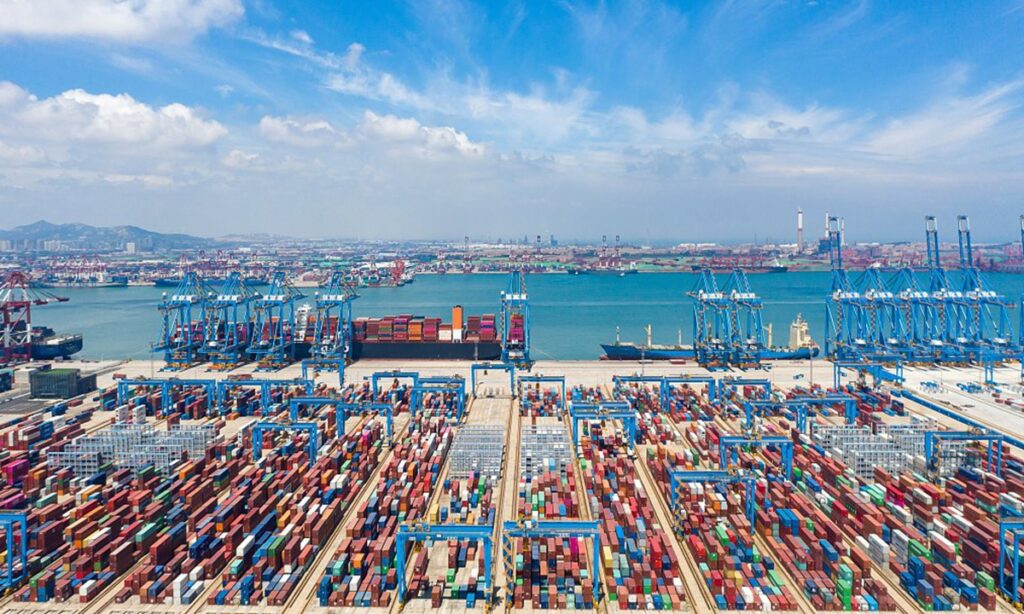Jörg Wuttke, president of the European Union Chamber of Commerce in China, said in a recent interview that at the end of his career in China, he may have to “witness China actually closing up again to some extent,” according to a report from the Chinese version of the Voice of America, the US government’s propaganda arm, on Saturday.
Wuttke’s remarks came as many Western politicians, media outlets and others have been stepping up their slander against the Chinese economy. At a time when the world economy is facing great uncertainty and challenges, the Chinese economy is also under downward pressure. Such a situation may increase some skepticism toward the Chinese economy, but it is far-fetched that Wuttke and others to claim that the Chinese economy is actually “closing up.” Anyone who has the basic knowledge of China’s efforts and determination to open up its market and improve its business environment over the years would know that such concerns are unfounded.
In fact, the Chinese market is one of the few emerging markets that have seen net capital inflows in recent years, with European business giants successively increasing their investment in China in 2022. Data from the Ministry of Commerce showed that China’s actual use of foreign capital reached $155.3 billion in the first nine months of 2022, a year-on-year increase of 18.9 percent.
The numbers speak volume for the continuing strong appeal of the Chinese market for EU investment, a clear indication of confidence on the part of EU businesses in the future of China. Such confidence stems from China’s stable economic performance, continuously improving business environment and ever-expanding opening-up efforts over the past few years. As the head of the EU’s main business group in China, Wuttke should be fully aware of this. Given the rising European investment in China, it is rather strange for Wuttke to claim that the Chinese market is closing.
China’s GDP grew by 3.9 percent year-on-year in the third quarter, a robust rebound following a 0.4 percent growth in the second quarter and beating general market expectations. There are good reasons to believe that the Chinese economy will continue its steady recovery. For instance, at a time when most of the world is dealing with the worst levels of inflation in decades, China’s consumer prices remain relatively low, creating a solid foundation for a stable recovery.
Moreover, China has always maintained stability and continuity in its opening-up policy. At the end of 2021, China issued the nationwide negative list for foreign investment, which was further shortened to 31 items, a demonstration of China’s commitment to further opening up its market.
According to the report delivered at the opening session of the 20th National Congress of the Communist Party of China, China is committed to its fundamental national policy of opening to the outside world and pursues a mutually beneficial strategy of opening up. It strives to create new opportunities for the world with its own development and to contribute its share to building an open global economy that delivers greater benefits to all peoples.
Certainly, since China put forward a new development pattern featuring “dual circulation,” there have been various doubts and overhyped concerns that the Chinese economy will turn inward. What needs to be acknowledged is that there are disagreements between China and the EU when it comes to opening-up, investment and other cooperation areas, which need to be addressed through coordination. But it is important not to exaggerate these differences, especially not to misinterpret them as a policy change or a directional adjustment, which is nothing but a misunderstanding about China’s fundamental national policy of reform and opening-up.
Meanwhile, such “concerns” raised by foreign business leaders also highlight their high expectations and eagerness to expand in the Chinese market, which is a good thing. As Chinese officials have repeatedly stated, China will always welcome qualified foreign businesses to invest in China and the Chinese government has been and will continue to make it easier for them to do so. If foreign companies are facing specific issues in the Chinese market, they should raise that with relevant Chinese authorities, who will help address them accordingly, as they have done during the COVID-19 pandemic. It is counterproductive for foreign business leaders like Wuttke to make such smearing and unfounded claims to foreign media outlets.
(Global Times)




